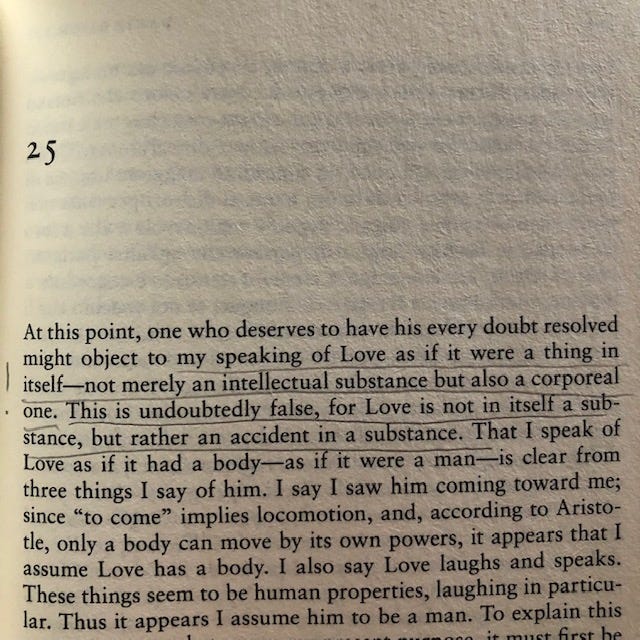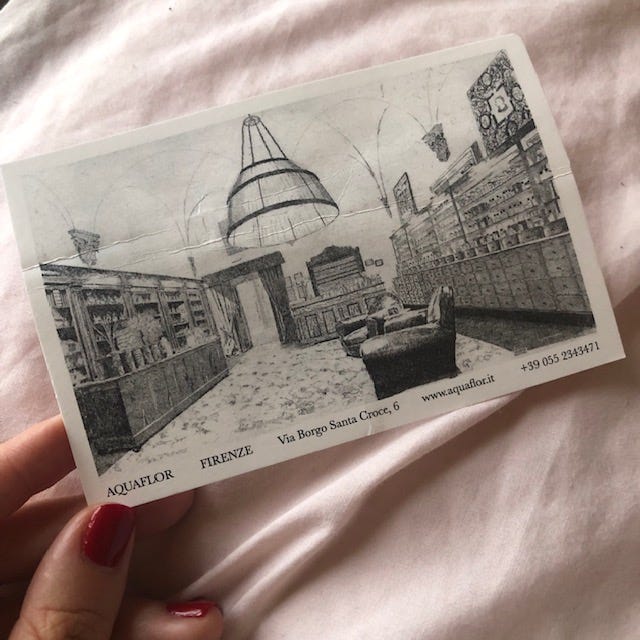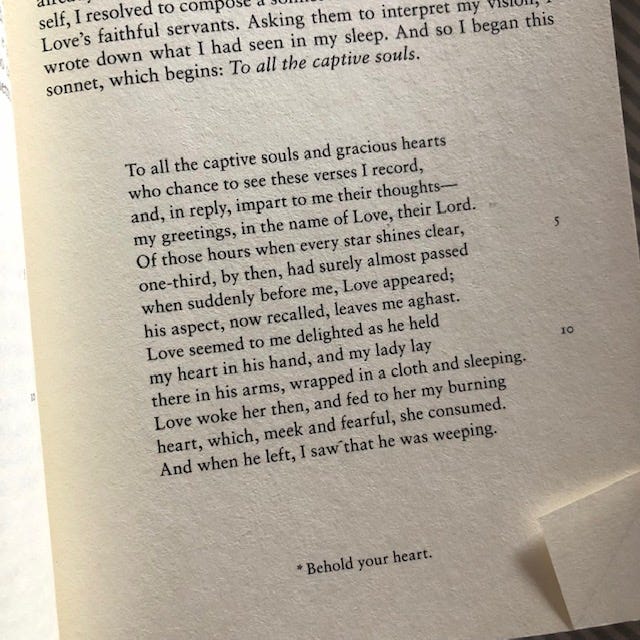A friend of a friend of my sister needed someone to housesit in a medieval walled village in Tuscany, so we leapt at the opportunity to escape the summer-that-never-started in Ireland. R went on ahead of me and I flew to Pisa alone, on a flight so delayed I didn’t get to the city til after two in the morning. The tower really does lean, and because it was so late when I got there I stood under one of the most tourist-saturated places in the world without another human in sight, alone except for the loud night-time drill of cicadas. In the morning I went to the oldest medicinal garden in the world (apparently) and got caught in a thunderstorm so loud that I thought at first it was motorbike engines starting up somewhere behind me. On the train to Florence I started reading Dante’s Vita Nuova, a book which I’ve now decided is one of the best things I’ve ever read in my whole life. If you haven’t read it, it’s kind of an experimental memoir told through sonnets, canzoni and accompanying prose commentary. First published in 1294, it describes Dante’s ‘new life’ after his first encounter with Beatrice,1 a love-at-first-sight situation with a woman he becomes so completely obsessed with that he can’t even bear to speak to her or be in her presence. Each section of Vita Nuova is split in three parts, the first describes the conditions and circumstances that led Dante to compose the poem, the second is the poem itself, and the third is a commentary on the poem’s structure and meaning. It becomes a treatise on the nature of love, desire, beauty and poetry, and what it means to be a captive of these obsessions. It is more about an obsession with writing itself than with any real human woman, Beatrice isn’t really a person but an absence, she becomes the empty space that a lifetime betrothed to poetry fills.
It’s possible that I’ve spent almost all of my life held captive by beauty, by turns obsessed by and fearful of its elusivity, and certainly I am not ashamed to say that there hasn’t been a single major life decision I’ve ever made that hasn’t been spurred on by the possibility of love. It’s true that writing is one attempt to cohere these impulses, but the writing of the thing is never the thing itself. Writing as a practice is almost always more about the act of writing than it is about any kind of worldly thingliness. In this way, a love poem is so much more about the yearning than it is about the woman-yearned-for. I think every poet already knows this. Like Dante, I am convinced that beauty is something more-than and beyond the visible. I think this is why I am attracted to relics2, or why on my same trip I climbed up to the basilica on the hill to listen to Gregorian chant in a language I couldn’t understand. Poetry gets at this invisibility, certainly, but so does, I think, scent! I’ve been trying to work out why I’ve been so obsessed with perfume lately, and I think it’s because it’s one aspect of the material world that speaks to something beyond the material, to something like aura.
The first perfume I can remember owning was Curious by Britney Spears, which I think I bought in Boots when I was 13 or 14. Fragrantica tells me it’s an aquatic floral with top notes of magnolia, pear and lotus but I remember it being fresh and lemony, and probably cloyingly sweet in the way all scents aimed at teenage girls are.
Then the first perfume I remember really loving was DKNY Be Delicious, which my friend gave me for one of my birthdays and it came in a pleasing acid green and silver apple-shaped atomiser. I’m almost positive it will make a comeback now, post-Brat summer, when that same lurid green is everywhere you look and snippets of people dancing to ‘Apple’ are looped into TikTok’s eternal oblivion, and fashion’s preoccupation with excessive Y2K nostalgia shows no signs of dissipating anytime soon. From what I remember, it smelled simultaneously synthetic and edible, a bit like apple flavour bubble gum with a soapy touch of cucumber. I loved it so much, the smell of it is inextricable with my scratchy navy acrylic school uniform jumper, and the holes I wore into the cuffs with my thumbs. I had dyed blue-black hair and exclusively wore heavy eyeliner and clothes made from black tulle during that phase of my life so it’s weird to think I was drawn towards such a bright, extroverted clean-girl scent, but then I don’t think teenage olfactory-distinctions are particularly sophisticated. The other smells I remember from prefab classrooms and linoleumed school corridors: Lynx Africa perpetually hanging in the atmosphere at all times and Charlie Pink body spray emanating from all of the girls.
Now the fragrances I lean towards are darker, and lurk close to the skin. I like incense, jasmine, myrrh, vanilla and patchouli. I’m interested in perfume as a cultural phenomena, and have grown a little obsessed with the history of perfume; with which particular fragrances have been popular at different cultural and political moments, and why that might be. For example – Nina Ricci’s 'L’Air du Temps’ was created in 1948 as an ode to the newfound ‘peace, love and freedom’ after the war. Riding the wave of post-WWII optimism and a newly bolstered economy that allowed for unnecessary luxury, it was sold with a lid made of two pearly white peace doves and bursting with playful sweet spicy notes. I don’t think it’s a coincidence either that this highly popular post-war perfume aimed at women accentuated a kind of hyper-femininity - abundantly floral smells like jasmine and rose - and was sold in a girly, curvaceous bottle. It coincides with the images I have of a post-war economy that encouraged the women who had worked in traditionally masculine roles during the war back into the home. Out with the structured shoulders and slacks of 1940s women’s fashions, and in with cinched waists and full skirts. I’m reminded of something (exaggerated, dramatique and not ENTIRELY true) someone said to me once about the sexy pencil skirts of the 1950s being inextricable from the lobotomies that put the women in them.
Then I think back to the scents that were popular during the peak-Celtic Tiger, 00’s consumerist opulence: Vera Wang Princess; the bejewelled bottles of Britney Spears Fantasy; Lacoste Touch of Pink etc… To me, these scents are the olfactive equivalent of paparazzied upskirt tabloid photos; Paris Hilton telling us to Stop Being Poor!; everything MTV but especially My Super Sweet Sixteenth; mean girls in school with GHD ironed hair and frosted eyeshadow, glittering crocodile clips and everyone in rural county Galway getting obsessed with paninis, cappuccinos, kitchen islands and unnecessary electric gates. It makes so much sense to me that a decade of excess, excess, excess, American-globalisation, and the dawn of reality TV would smell like bubblegum, candyfloss, fizz and latex balloons popping somewhere in the distance, at the party you probably weren’t invited to.
When I got to Florence I visited a niche, independent perfumery called Aquaflor, which was housed in a dimly lit Renaissance palace on a cobbled side street just around the corner from the giant statue of Dante himself. I visited the shop four times in three days and tried about thirty different samples of scents that had been imagined and concocted in their laboratory in the basement. Lately I have been imagining, dreaming, the perfect perfume for me: it will have a slightly smokey, powdery iris top note evoking a lipstick print round a shared cigarette; sensual heart notes of night-blooming jasmine and vanilla, like walking through a hot Mediterranean city alone eating an ice cream at night, and then a deep base of churchy frankincense and myrrh, patchouli and motorbike-jacket leather. Does such a perfume exist? Will I ever find it? Do I have to create it myself?3 I didn’t find this mythical, fantasy perfume but I settled on a tiny bottle of one called Derwish. It’s first hit smells like sweet mandarin oranges, and the dry down has very light notes of incense and myrrh and a lingering sweet scent like powdered sugar on a square of Turkish delight. I think it’s supposed to evoke dervishes whirling into sacred ecstasy and falls into that vaguely Orientalist category of exoticised fantasy that doesn’t exist in reality (when I experienced whirling dervishes in reality I remember it being in a big cold, austere stone room, there were no mandarins, or incense, only the smell of rain from outside, hand sanitiser and that slightly chemical smell that a recently cleaned room often has.) But perfume is all about fantasy, I don’t mind.
This is what is so intriguing about perfume; we don’t need it, we can’t see it, it’s the one product of the beauty industry that has absolutely nothing to do with what the wearer looks like, it can’t be photographed, or ever really adequately described, and yet so many of us are so compelled by perfume. How mysterious. We spend too much money on tiny bottles of an invisible substance that lingers on the skin for an hour or two and then dissolves into the aether. I love how pointless it is from a rational perspective, how completely unnecessary, excessive, luxurious (please bear in mind I am writing this all as someone who qualifies for a medical card!) But like poetry, perfume is a deeply personal, intimate, erotic mode of excess. We don’t necessarily need it, but our lives are enriched and dazzled by its addition. Perfume becomes unique to the wearer, the chemicals react differently to individual skin and sweat and get into the wearer’s bloodstream, becoming part of our make-up. I can’t think of a material substance more intimate than the way a flicker of unexpected scent on the wind can trigger an avalanche of associative memories. I once had a friend I haven’t seen in several years, a man I met in London when I was 19 or so who approached me at an open mic and told me I had a slightly terrifying aura. I don’t know where he is now, what his real name is or how to begin to look for him, but he always wore a particular green, pine-needle aftershave that I’d smell whenever I hugged him goodbye or hello, and sometimes now, walking down Henry street or some other crowded place some random man who is wearing it will pass me and I will whip around thinking for a split second it could be him, and suddenly I’ll be in a daze, out of time, remembering standing under rainy bus stops at night, drinking too-strong gin & tonics in a warehouse or vinegar-sour bottles of house wine a north London pub, talking about songs and writing.
I’m not really interested in commercially produced fragrances by major designers and mainstream perfume houses,4 most of my scent interests are reserved for small one-wo/man independent perfumeries who I think of a perfume artists or when I’m being particularly dramatic, poets of scent! I am an intrigued fan of Marissa Zappas, a young independent NYC-based perfumer, poet and I believe, anthropologist, whose fragrances ‘blend fantasy, reality, the gothic, and the modern.’ I discovered her through reading a Fragrantica review of her fragrance ‘Flaming Creature’ which is a collaboration with poet M Elizabeth Scott and is described as a hazy narcotic ode to the 1963 Jack Smith film Flaming Creatures. According to her website copy, ‘it produces subtle smoke, while scenes of wilting jasmine flash before your eyes, encouraging a surrender to its flickering hallucination.’ Having bought a tiny 1ml sample, I would say this is an apt description. I can’t find the original bizarre and alluring review that led me to buy this sample but recent reviews on Fragrantica say things like;
Flaming Creature is a toxic relationship in a bottle. It holds you hostage like a heart-racing liquid spell, which honestly explains why I could never walk away from it. I was hooked even though I tried to convince myself that I didn’t like it”
and
Boozy, humid, intoxicating, and dangerous. A sip of absinthe in the back of a burlesque club playing Artie Shaw's "Nightmare". A pair of velvet opera gloves drawing a knife. Wafts of heady jasmine wrapping ghostly tendrils around you and squeezing.
and finally, my favourite:
This is a beautiful, evocative, unsettling perfume. When I first put it on, I smell something (or perhaps someone) literally burning, charring, and turning into ash. It smells like charcoal. Then after the being is deceased and the ashy outline of their body/carcass collapses into itself, the flakes and black powder of the charred being move around in the breeze. There was no witness to this, whatever it was, that happened. There is a scent of night air and jasmine flowers, as well as evergreen trees. The evergreen trees are tall and their branches sway. There is still some smoke floating up to the sky. Night-blooming blossoms add a sweetness to the breeze that feels both cruel in its indifference, and comforting, because it reminds you that life goes on. The creatures of this world all return to dust, flaming or not. It brings to mind the Douglas fir trees of Twin Peaks, or the scene in Mandy where she is burned alive.
This is all a really good example of everything I like about wasting time deep in the annals of Fragrantica user reviews and also perfume itself. Like love, scent makes people lose their heads, and momentarily lapse control of their rational judgement. I want a life with sonnets in it, I want a life with jasmine oil and frankincense dabbed needlessly, deliciously against the veins of my wrist. A life as love’s captive is a life so well lived to me.
PS to thank the people who have been paying to receive these letters I am including a little extra section here that is just for paid subscribers. thank you so much, bread and roses to me is …. rent and perfume.
Keep reading with a 7-day free trial
Subscribe to mystes to keep reading this post and get 7 days of free access to the full post archives.





